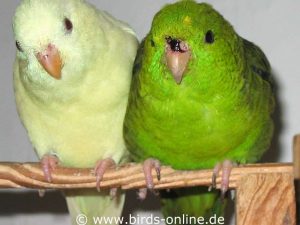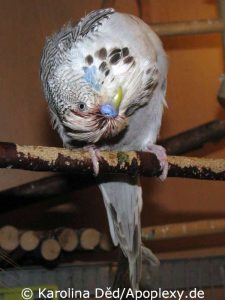- >>
- Birds Online – English
- >>
- Health and diseases
- >>
- Accident-related diseases
- >>
- Concussion
Concussion

While birds are flying free in a house, unfortunately, accidents can occur. Sometimes, birds crash into walls, windows, or furniture. But such collisions can also happen while the animals are inside their cages or aviaries. For example, if they are scared at night, they might try to escape in the dark and crash into the cage bars. During such incidents, birds can suffer serious injuries like broken bones, lacerations on the nose, or even a fracture of the beak. Because many birds crash headfirst into an obstacle, there is a risk that they may suffer concussions, sometimes in addition to other injuries. How to recognize concussions in birds is explained in this chapter.
Symptoms

After a violent collision, some birds sit dazed on the ground. If this condition lasts longer than a few minutes, there is most likely a head injury. In addition to a concussion, skull fractures and brain haemorrhages are also possible. Unlike concussions, these are not treatable and often lead to the early death of the feathered accident victim.
If you are dealing with a mild concussion, the temporary drowsiness is accompanied by temporary and usually only short-term coordination problems. Most probably the bird isn’t able to fly. Furthermore, the bird has great difficulty in maintaining its balance. If a bird vomits after a collision, this is also a possible symptom of a concussion. In many cases, the aforementioned health problems disappear on their own within a few hours or one to two days. Nevertheless, it makes sense to consult an avian vet as soon as possible. The affected bird should be examined in any case, even if it is only a mild concussion.
With a moderate concussion, the affected animals often fall to the ground after the collision but remain conscious. They can usually no longer fly and some may squirm in cramps or stagger. Sudden paralysis as a result of cerebral hemorrhage or uncontrolled twitching of the limbs may also occur. Often, animals suffering from a concussion twist their heads extremely in one direction or leave their wings hanging limply.
With a severe concussion, the animals may be not only dazed but appear as if they have lost consciousness. Many affected birds can hardly stand upright. They’re unable to move and may be trembling. Very often severe vomiting occurs because the animals are nauseous. Both moderate and severe concussions are serious injuries, which is why an experienced avian vet should be contacted as soon as possible.
Birds who have suffered a concussion usually are sensitive to light, which is why they keep their eyes closed. They sleep a lot and some tend to fall off their perch. They have hardly any appetite, puff up their plumage, and instinctively seek rest.
What you should do
Normally, I always advise you to consult an avian vet immediately and directly in case of illness or after an accident. In the case of a head injury, however, great caution is required, as, for example, a bumpy drive by car could cause enormous damage to the bird depending on the physical condition and severity of the injury. But doing nothing is not an option either. If you suspect your bird suffering from a concussion, you should immediately call an experienced vet and talk to him or her about it. Please do so even if the bird was injured late in the evening or on weekends. It is best to try to reach the emergency veterinary service or a veterinary clinic. Usually, avian vets are not available at night or on weekends. But it is important to talk to any vet about your feathered patient’s condition! Any help offered by a vet is better than no medical support!
Depending on how stable the condition of your bird is, you will be advised to take him or her to the practice/clinic. Or you will be advised to provide first aid yourself to stabilize your bird’s health status so that the animal will soon be sufficiently strong to be transported to the vet. Some vets make a home visit if a severe concussion is suspected, but this should not be expected in every case.
Safe and gentle transport to the vet
Your vet will likely ask you to bring the bird to his practice or clinic as soon as possible, taking into account some aspects discussed with the expert. In this case, cover the bottom of the cage or box you will put your bird in with a soft cloth and remove all perches. Your sick bird will most probably sit on the ground and therefore will need the padding. Please do not use a towel with fine cloth slings, because the bird could get stuck in it with the claws. It is best to place a second cloth on the bottom of the cage. Fold it so that the bird can lean against it to avoid falling over on the way. Also, cover the cage or box with a dark cloth, as the bird is very sensitive to light due to the concussion
If it is cold outside, the bird must be kept warm. Attach a warm buckwheat pillow to the transport cage or box so that the bird cannot burn itself on it. If the pillow has not been heated too much, you can also put it on the bottom of the cage, cover it with a cloth and place the bird on it. However, it should not get too warm in the cage or box, because birds suffering from any head injury should not be exposed to heat. The heat would cause the blood vessels in the head to dilate and the pressure to rise. This could cause a significant deterioration in the condition of the injured bird! So you have to make sure that the bird does not overheat, but also does not feel cold.
Make sure that the bird is exposed to as few vibrations as possible while you’re on your way to the avian vet. Rather take a detour to avoid particularly bumpy routes with potholes or cobblestones. Please do not listen to music while you’re driving, because birds suffering from a concussion are often also sensitive to noise.
Treatment
Depending on the severity of the concussion, your vet will prescribe medication for the bird, which you will need to administer as your doctor has told you. Once at home, the bird must be placed in a very quiet, darkened room, where the temperature should be around 21 °C. If your bird suffers from a head injury or concussion, heat therapy with an infrared lamp should not be applied under any circumstances! The only exception is if your vet explicitly orders this therapy in the individual case. Please keep in mind: Although infrared light is a perfect remedy for most diseases, it is generally contraindicated for any kind of head injury.
In addition to the medications prescribed by the avian vet, you can use naturopathic remedies to support your bird. After a serious accident, the use of Heel Traumeel S drops may be useful. These are available without a prescription in pharmacies (please use the drops without alcohol if possible). A tame bird should be instilled with a drop mixed with a little water every half hour if its state of health allows it. If your bird is too weak, you should avoid any stress and add the Traumeel S drops to the bird’s water. Attention, some birds can hardly swallow after a head injury. Therefore you should not force your bird to swallow any water or drops because they could run into the trachea and thus lead to suffocation!
Bach flowers should also be helpful, naturopaths emphasize. Many avian vets, on the other hand, do not believe in an effect. But as an additional remedy, you can try them since they will most probably do not harm you. For concussions, rescue drops are used in naturopathy. A drop of this preparation should be placed on the center of the injured bird’s head or neck.
Special nutrition
Birds suffering from a concussion, especially in the first few days after the accident, feel severe nausea and tend to vomit. Therefore, in consultation with your avian vet, change the daily diet to easily digestible food. Fresh fruits and vegetables, as well as wild herbs and other food from nature, are usually allowed. This applies as long as no other health issues contradict it. Soaked or sprouted seeds are well suited, as both are easily digestible. Also, semi-ripe millet is a perfect food for injured and weak birds since it is tasteful and easily digestible.
To strengthen the general condition of an injured bird, you can add glucose or honey to the water (1 tablespoon of honey per 1 liter of water), unless otherwise indicated, because the animal suffers, for example, from a fungal infection, avian gastric yeast or any kind of kidney disorder. Since a bird vomiting repeatedly loses a lot of fluid due to the constant choking of the food mash, make sure there is always enough water at hand.
